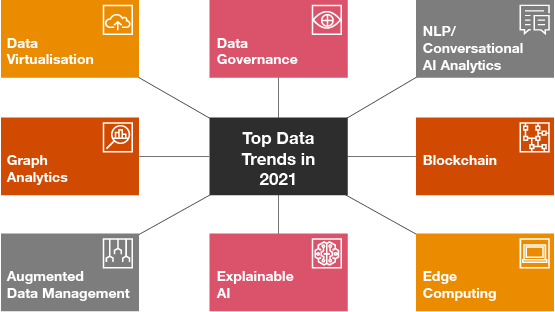Data and FinTech in the banking sector: the foundation for innovation
Monetisation of data is paramount for banks to stay competitive, compliant and able to adapt to the changing winds
Data has become one of the world’s most valuable resources. Banks are under increasing pressure to use data and analytics to answer important business questions and provide best in class solutions to their customers. With the emergence of new data streams and technologies, such as cloud computing, artificial intelligence (AI) and machine learning, the penalties for not staying ahead of the curve can be enormous.

Given the complex challenges that banks are facing around changing customer behaviours, regulatory changes and data storage and quality, it isn't a surprise that banks are struggling to get the most out of their data.
Digital-first companies such as Big Techs (e.g. Facebook, Amazon, Google) and neo-banks (e.g. Monzo, Starling, Revolut), were among the first to capitalise on data and emerging technologies to transcend industries. Without the burden of legacy IT infrastructure, these organisations are able to scale products at pace to meet rapidly changing customer demands.
To stay competitive, banks need to focus their data strategies on leveraging customer data in new ways to provide personalised digital solutions and to identify new revenue streams.

Personalisation: using customer data to provide agile digital solutions
Personalisation of services and the ability to evolve products to meet changing customer demands will be critical for banks looking to retain and attract customers.
Although robotics has been around for a long time and chatbots are being deployed across many industries, the banking sector is looking to use their rich customer data coupled with AI to provide automated advice to customers and streamline processes.
Banks are creating robo-advisors - algorithm-driven platforms - to provide financial and investment management advice and to even make lending decisions. By applying Machine Learning and AI to large datasets, banks are able to provide rapid risk assessments and tailored advice based on the customer's personal financial situation and goals.
Barclays, for example, launched a robo-advisory service in 2020, in partnership with a Munich start-up that offers and manages personalised investment plans up to £5,000 following a questionnaire on the customer's financial risk appetite.
However, it's critical that these AI driven services are transparent and without bias. As the technology still requires human interactions to train the algorithm and input quality data, there is large room for unintentional bias to be coded into these services.
The need for explainable AI, where banks are able to trace all the way back to the source, explain why a decision was made and remediate issues effectively, will be a major focus for incumbents and regulators. FinTechs such as Smarter Human and Alibi are working with organisations to monitor risks, biases and data quality to ensure auditable AI that is fair for everyone.
Delivering market insights and unlocking new revenue streams
Equally important is that banks understand how the vast amounts of data they collect can be used to identify and mobilise new revenue streams.
Banks need to stop looking at data from a compliance perspective, with many banks coming out on the other side of GDPR programmes, and transform this data to unlock key strategic insights.
Open Banking and APIs have offered third parties and FinTechs an entry point into Financial Services by allowing collaboration and access to incumbent banking data, which is leading to significant innovations within the industry. Natwest, for example, is leveraging an open banking data model alongside a FinTech partner to provide detailed and real-time spending insights to customers; and FinTechs such as Fligoo are partnering with incumbent banks and wealth managers to deliver insights into customer behaviours. With this intelligence, investment advisors can strengthen customer relationships by creating personalised communications, and create tailored on-sell opportunities.
In other collaboration models, non-EU based incumbents are collaborating with well-established social media platforms to tap into a wider audience and offer digitally enabled services that banks alone don’t have the capabilities for - such as the ability to apply for credit cards and loans via the social media platform on a customer’s mobile phone.
Gaining access to a wider set of customer data through these platforms gives banks the opportunity to match offers and products to credit card holders and offer customised products.
Traditional banks are uniquely placed to service changing customer demands
Banks that understand their data and create solutions that are collaborative and agile by design will unlock new revenue streams and continue to service their customers against an ever changing landscape.
By utilising the trust of their customers, alongside an effective data strategy and FinTech partnership model, they will continue to be better placed to be the primary provider of financial services for customers.
The UK continues to lead the way in innovating how financial services interact and use data. With the majority of banks now feeling more confident about sharing data with third party organisations this makes sharing and collaborating a more attractive proposition.
Across the globe, FinTech regulation is catching up with the innovation shown by Europe. In Asia, strong digital licensing frameworks are being set up to match the pace of FinTech innovation and eCommerce, while in the USA attention on decentralised finance and digital assets is growing.
As these regions grapple with different client expectations and the innovation of specific technologies, incumbents, challengers and adjacent players will all need to keep their fingers on the global pulse. With data becoming an ever more important bedrock for staying competitive, all organisations will be required to adopt and explore new ways of working.

Source - Raconteur: Future of FinTech







